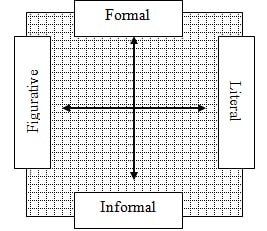Some ways to think about word choice— and sound really smart while you’re figuring it out!
Purpose: When analyzing the style of prose or poetry, the opportunity to show off what you know about diction (an author’s word choice) frequently appears. These notes are meant to give you a framework and a vocabulary so that you can analyze and discuss matters of diction with confidence and precision.
When this matters: Whenever you need to do any of the following:
 (a) Discuss or analyze how “the language” of a passage or poem achieves some effect.
(a) Discuss or analyze how “the language” of a passage or poem achieves some effect.
(b) Analyze the “techniques” or “poetic devices” used to achieve some effect.
(c) Answer a question that specifically mentions the word “diction.”
Two Axes: The term “diction” covers a lot of ground, but here is a somewhat simplified way to approach it. Consider analyzing the diction according to where it falls along the two main axes: (1) Levels of formality, and (2) Literal vs. Figurative, or Connotative vs. Denotative, content.
(1) Levels of formality
Diction can usually be described as one of three “levels” of style:
High or Formal: Dignified, elevated, and perhaps impersonal. Elaborate, or sophisticated vocabulary. In some cases, “high style” can refer to grammar, or syntax, that has been manipulated for an artistic effect—that is, the grammar calls attention to itself. Polysyllabic.
Middle or Neutral: Follows rules of grammar and uses common, unexceptional vocabulary. Think Strunk and White. Grammar and vocabulary is meant to be transparent, easily understood.
Low or Informal: Plain language of everyday use, including slang, jargon, vulgarity, and dialect. Monosyllabic.
(2) Literal vs. Figurative (Denotative vs. Connotative) content
In addition to falling somewhere on the above axis, an author’s word choice will fall somewhere on a scale between the two poles of denotation, a word’s dictionary meaning, or connotation, the more metaphorical or poetic usage of words.
The word itself may be rich with connotations (associated contexts or multiple meanings), and/or the way the word is used may invite consideration beyond the literal, as in a pun or double entendre. And sometimes, a cigar is just a cigar.
